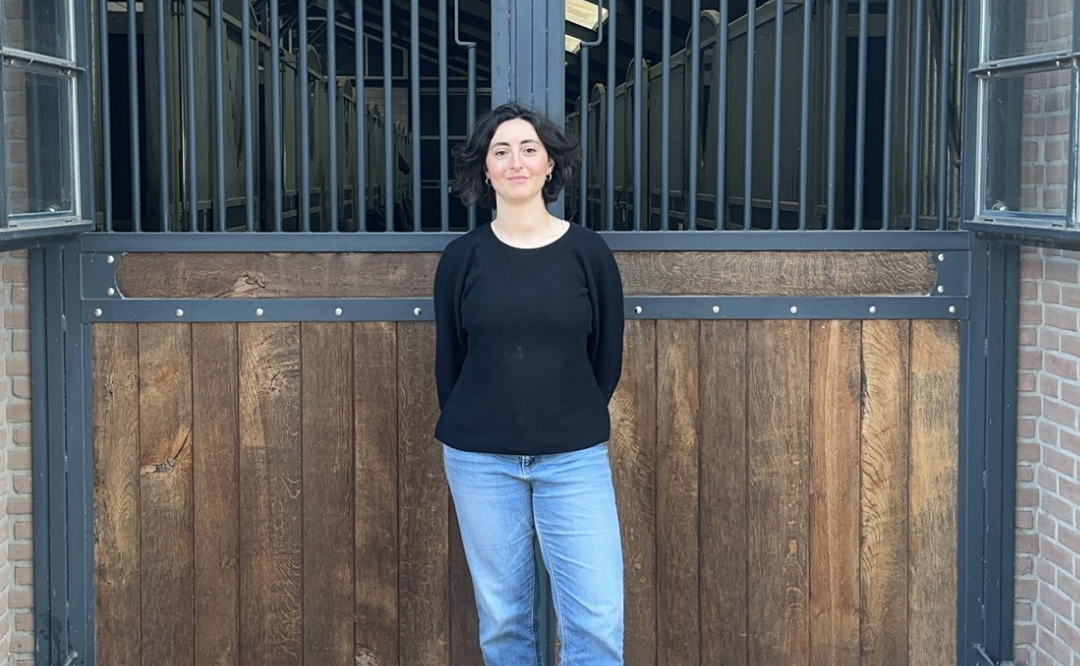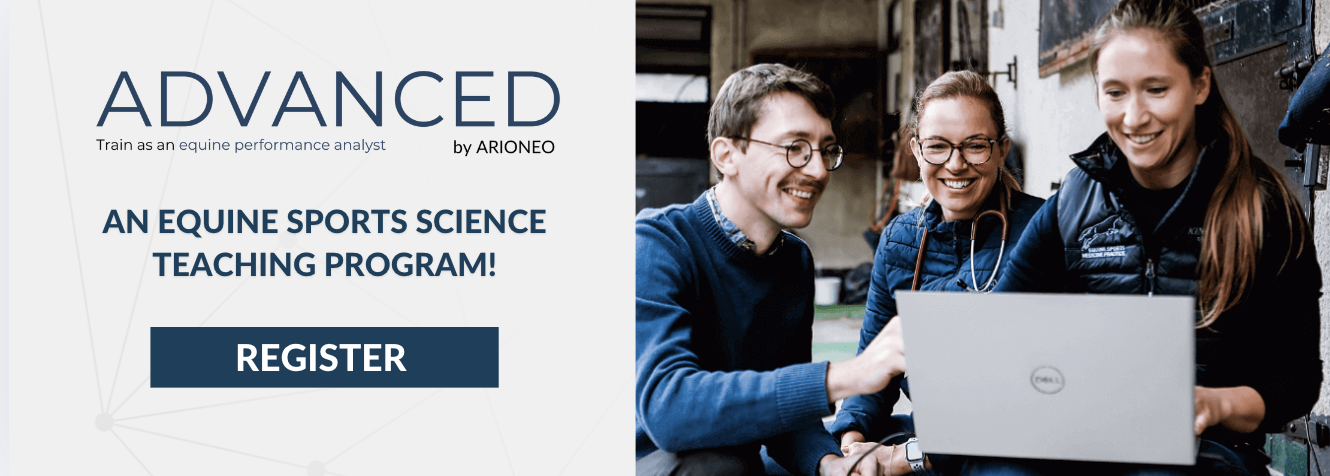Following the first session of our Advanced program, dedicated to training in the analysis of equine athlete performance data to optimize their well-being and health, we had the opportunity to interview an alumna.
In this article, we introduce you to Giordana, an equine science and osteopathy enthusiast. Giordana tells us about her background, her experience with the Advanced training, and how she integrates data into her daily life.
Discover how the Advanced program has enabled her to perfect her data analysis and strengthen her approach to monitoring and training horses.
Could you briefly introduce yourself?
I’m Giordana, and I recently completed the Advanced program. I am an MSc Equine Science graduate qualified as an Assistant Trainer through the British Racing School. Currently, I am based between the UK and the Netherlands, where I am training as an Equine Osteopath.
My career started in show jumping as an assistant rider and yard manager, and in 2022, I transitioned into racing. I initially worked on the event side of the sport working at Ascot Racecourse and subsequently gaining experience in various competition and racing yards.
My first approach with data was in 2017 when I used a Polar device to analyze the effects of interval training on a horse with inconsistent performance. I fully embraced data analysis during my Master’s degree, focusing primarily on symmetry and gait analysis.
What motivates you to pursue a career as a data analyst?
I come from a sports background. My entire family has always been actively involved in sports, especially football and tennis. When I started riding, I noticed that performance analysis in equestrian disciplines was evolving differently compared to other sports, despite the similar level of professionalism.
I have always been passionate about integrating science into all stages of training, including recovery. My goal is to enhance horse performance while minimizing the risk of injuries. I believe that analyzing heart rate, stride length, and frequency, along with recovery data, offers a comprehensive and sustainable approach to tracking training progress and achieving goals.
What was your motivation for enrolling in the Advanced training?
The uniqueness of the Advanced program is unmatched; there is no other program like it out there. It allowed me to combine my interest in equine exercise physiology with my training background in a program that was truly tailored to performance data analysis.
Besides, as an osteopath in training, we often receive subjective information with limited objectivity apart from cases coming with specific diagnosis. Therefore, I wanted to incorporate scientific data into horse anamnesis to make the treatment more effective and allow the horse to recovery and perform at its best.
How did you manage your training regarding your organization with your daily routine?
It was a bit tricky, to be honest, especially at the beginning, as I was completing my full-time training for my Equine Osteopathy course. However, the whole platform is very well-done, allowing you to log in and out and watch all the registered lessons at your convenience. So, after my training day in the evenings, I would log in and catch up on all the lessons.
Additionally, the Arioneo team and all my classmates were very helpful. Any questions or doubts I had were promptly answered by them, so I found it easy to clarify any uncertainties and catch up on anything I missed.
Have you taken any data-related training courses before?
Not specifically focused on data in equestrian disciplines. I have attended a few demos from some equestrian software and have done research by reading papers and tried different devices. One of the reasons I applied for the course indeed was the uniqueness of the program. It offered something that was not available anywhere else.
Regarding the modules, which courses did you prefer?
I really enjoyed the live classes with international hosts. It was incredible to participate in roundtable discussions with trainers and experts from different countries, where I could learn about various training and data experiences. I also appreciated the modules on the cardiorespiratory system and sport horse pathologies.
The Excel introduction before delving into longitudinal analysis was also particularly helpful. Although I had used Excel before, I had never applied it for that specific purpose. The module was valuable in preparing me for performance analysis, especially as it complemented the physiology and training physiology modules. I found this integration extremely beneficial and appreciated it greatly.
What is the added value of the training in your preparation to become a data analyst?
Two things stand out. First, having the opportunity to meet and discuss topics with people in the industry. For instance, in my group, there were several veterinarians, trainers and retired jockeys. All people from different countries and backgrounds merging in a really stimulating environment, where we exchanged ideas and worked together in groups. That was incredibly valuable.
Second, the fact that the contents and platform have everything you need to really dive into the topic.
If you had a message to convey to trainers, what would it be?
Trust science and trust the new generations. We are here to help.
Would you recommend the Advanced program?
Absolutely, I would. First, the overall experience was great. The program and the amount of knowledge it offers were impressive. What really stood out to me was how well-organized the information was. Coming from a background in exercise physiology and equine rehabilitation, I often find that the volume of information available can be difficult to integrate. However, in this program, everything was structured in a way that made it easy to understand and apply.
Secondly, the opportunity to meet people from diverse backgrounds was incredibly stimulating. As I mentioned before, I had the chance to interact with veterinarians, retired jockeys, trainers, and individuals who had used Arioneo before, as well as those who hadn’t. This diversity of perspectives was invaluable. Additionally, connecting with people from around the globe added immense value, as it was fascinating to see how different individuals approach the same sport from various viewpoints.
Which profile would you like to work with?
I am looking to continue working with sport horses, particularly show jumpers and eventers, by leveraging data analysis to enhance their performance and minimise injury risks. My aim is to support owners and trainers in achieving their goals.
As an osteopath in training, I recognise that combining data from training and recovery with the horse’s history and evaluation provides invaluable objective insights. This approach not only enhances the effectiveness of osteopathic treatments but also facilitates a progressive assessment of the horse’s condition, helping to prevent overtraining and undertraining, that can easily lead to injuries.
I am passionate about this as objective science and data, such as numbers and statistics, offer deeper insights compared to purely observational methods. By tracking a horse’s progress from the beginning of training to data collection, I can provide better preventive care and ongoing monitoring.
My approach involves using Equimetre, followed by regular check-ups to ensure continued performance and prevention. In summary, my focus is on integrating performance enhancement with a strong foundation in prevention, as achieving high performance is impossible without it.
Thank you, Giordana, for sharing your journey with us. We look forward to seeing the continued success and advancements that you and all our alumni will bring to the field of equine sports science. We wish you every success as a data analyst.
For those interested in learning more about the program and how it can benefit your career, please visit the Advanced webpage.
Contact:
📞 +44 07915820019
🌐 Equineperformancetraining.com
@Equineperformancetraining
Key Words: Arioneo Institute, advanced, program, training, equine data analyst, horse performance analyst, sport science horse, equine sport science, training program equine, equine learning, equine careers, horse career, equimetre, data analyst.


